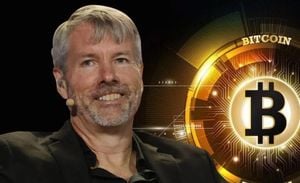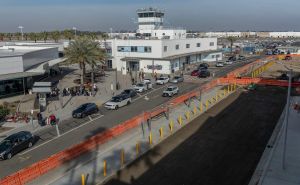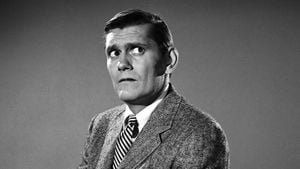Security was tight for the highly anticipated soccer match between France and Israel held at the Stade de France on the evening of November 14. With tensions running high following recent antisemitic incidents, authorities deployed approximately 4,000 police officers alongside 1,600 stadium staff to secure the game.
Deputy Police Chief Laurent Nuñez stated, "The match is under close scrutiny due to its high-risk nature, particularly after the violence witnessed against Israeli fans last week during matches held in Amsterdam." These precautions were largely due to the attack on fans of the Israeli club Maccabi Tel Aviv, who were reportedly assaulted by local youths who were influenced to target Jewish people amid the regional conflicts. This led to several injuries and multiple arrests during the violence.
The mobilization of police was not just confined to the stadium. Additional officers were stationed on public transport and throughout Paris, reflecting concerns over potential disturbances linked to the match. Nuñez assured the public, saying, "We will not tolerate violence. There's been considerable planning to prevent any incidents during this event, and the safety of fans is our utmost priority." An anti-terrorist security perimeter was also established around the stadium, emphasizing the seriousness with which French authorities approached the occasion.
Despite the heavy security, the atmosphere inside the stadium was one marked by both celebration and protest. The match drew only about 20,000 fans—about one-quarter of the stadium's capacity—which was somewhat surprising considering the significance of the event and its expected symbolic display of support from French President Emmanuel Macron. Macron's presence was meant to reinforce France's stance against antisemitism, following several incidents of violence directed at Jewish communities over the past weeks. His attendance served as not only symbolic support for the team but also as solidarity against hate.
The soccer match ended without goals being scored, resulting instead in widespread attention on the atmosphere created by protests both before and during the game. Outside, activists protesting against the Israeli actions during the Gaza conflict significantly increased tensions. Hundreds of protestors gathered, denouncing the actions of the Israeli government and accusing it of committing crimes against humanity. Signs reading “We don’t play with genocide” were prevalent, highlighting the political tensions entwined with the sporting event.
Inside the stadium, when the Israeli national anthem played, anti-Israel activists were heard booing; to combat this disturbance, game organizers boosted the volume of the anthem to drown out the jeers. Several Israeli fans were also seen wearing shirts with messages alluding to the recent violence they had endured. Despite the attempt to provoke, the event remained largely peaceful, with minor scuffles quickly contained by security personnel.
Before the match, security measures included systematic pat-downs and bag checks, echoing previous experiences of violence at sporting events. While some fans anticipated dangerous encounters, many remained optimistic about their visit to Paris. For example, Maccabi Tel Aviv's coach, Ran Ben Simon, expressed his gratitude, stating, "We want to thank the security people for protecting us during our time here. It was extraordinary what they did to keep us safe."
The match's backdrop hints at larger societal issues, with many participants on both sides seemingly caught between spirited fandom and the broader geopolitical conflict surrounding Israel and Palestine. Public sentiment is deeply polarized, reflected by protests and counter-protests occurring simultaneously amid the game. French President Macron stated prior to the match, "France will not yield to threats of antisemitism, and our sportsmen and women deserve to play without fear of violence. We must show solidarity." This echoed sentiments of various officials and community leaders who stressed the importance of unity during times of conflict and unrest.
Overall, the heavily secured match represented not merely a sporting event but also the intense sociopolitical tensions facing both countries and their communities today. Many headlines echoed the necessity of maintaining peace and the shared hope for camaraderie among sports fans, artists, and everyday citizens from diverse backgrounds. This match not only illustrated the passionate nature of soccer but also showcased how global and local issues intersect, reminding all present of the broader significance of unity, whether through sport or otherwise.



